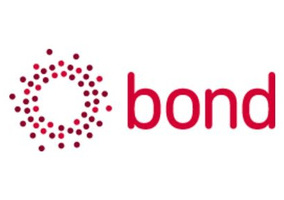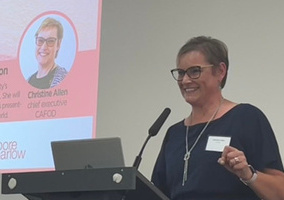This week, the latest version of the Band Aid charity single Do They Know It’s Christmas? premiered to mark the song’s 40th anniversary.
Singer-songwriters Bob Geldof and Midge Ure and producer Trevor Horn released the 2024 “ultimate mix” version on Monday, with the song blending previous recordings released in 1984, 2004 and 2014.
Despite some positive reactions from listeners, Band Aid 40 has reignited a debate around the song’s portrayal of Africa and role of UK charities supporting beneficiaries there.
Supporters have highlighted the millions raised for good causes over the past 40 years and positive response from funding recipients.
However, critics have said its lyrics are “patronising” and the campaign contrasts with the international development sector’s focus on shifting power to local communities and moving away from “white saviour” narratives.
The origins of Band Aid
The origins of Band Aid stem from a BBC report aired in October 1984.
For the first time, the BBC showed the impact of a drought-induced famine in northern Ethiopia, with correspondent Michael Buerk describing it as a hunger crisis of “biblical proportions”.
The report contained graphic footage of Ethiopians, including children, facing acute malnutrition and starvation and galvanised the world’s attention including that of Geldof.
The same year, Geldof and Ure wrote Do They Know It’s Christmas? to raise money for the famine and enlisted singers and celebrities including Boy George and George Michael to record the song under the Band Aid name.
Released in December 1984, the single raised around £8m and remains one of the UK’s biggest-selling singles ever.
In a parliamentary debate on the 40th anniversary of the Ethiopian famine, Liberal Democrat peer Baroness Featherstone said the broadcast “woke millions of people across the world to both the suffering of the people and the scale of the inequities across the world”.
“It was transmitted by 425 television stations worldwide and gave birth to world fundraising in a way that we’d never seen before, in the shape of the unforgettable Live Aid concert in July 1985, driven by Geldof.
“It spawned Band Aid and subsequent initiatives such as the Jubilee 2000 campaign and Make Poverty History. It galvanised a whole generation into action.”
Band Aid Charitable Trust
In April 1985, the Band Aid Charitable Trust was established by its six current trustees, including Geldof and Ure, to administer the funds generated from the sales of the song.
The trust was also used to collect donations pledged by millions of people worldwide who had watched the Live Aid concerts in London and Philadelphia in July 1985.
The charity does not employ any staff, with the trustees being the key management personnel responsible for all decisions and authorisation of payments.
Accounts for the year ending 30 November 2023 show that within two months of the release of Band Aid 30, the charity had awarded grants of over £1.9m to projects in west Africa to help fight the spread of Ebola and support those affected by the disease.
No grants have been awarded in recent years from the Band Aid 30 fund to support ongoing Ebola-related projects as the charity “received no funding applications to support this work”, the accounts say.
“Instead, the limited Band Aid 30 funds brought forward from FY22 totalling £205,319 were utilised to support UNHCR in the provision of clean water for Somali refugees and the host communities in the Doolo zone in the Somali region of Ethiopia.
“This work included the construction of a new borehole and water storage facilities and the rehabilitation of an existing water system.”
In 2022-23, the charity awarded grants to other charitable organisations, including ActionAid, UNICEF and Hamlin Fistula, for projects in Africa totalling £2.34m (2021-22: £1.73m) and recorded a total income of £2.40m (2021-22: £1.90m)
Since its inception, the charity has received a total income of £146m and provided funds for long-term development projects and emergency aid, with the majority of the funds originally raised spent on projects in Ethiopia and Sudan on an ongoing basis.
Joe Cannon, who works as a pro bono chief financial officer for the Band Aid Charitable Trust, tells Civil Society that the current charity’s activity is “representative of the work we’ve supported over the last 40 years”.
He says: “In the financial year to 30 November 2024, Band Aid has awarded grants of £3m across 16 projects to date.
“As in recent years, the majority of these projects are in Ethiopia; many of them are wide-ranging emergency interventions designed to provide basic support and relief to vulnerable people impacted by drought across the country or the conflict in Tigray which the region slowly continues to recover from.
“In addition, we’ve awarded grants to emergency projects in Sudan, Somaliland and Chad to support refugees fleeing violence or hunger.”
Cannon adds that the charity continues to allocate funding to support projects that deliver “measurable results in smaller communities with a focus on longer-term, sustainable development”.
Some of the activities the charity has undertaken this year include the provision of life-saving medicines and medical supplies; training to prevent gender-based violence in communities; and drought-resistant crops.
“The estimated number of beneficiaries per the funding proposals totals more than 350,000 people,” Cannon says.
Cannon says the money raised from the Band Aid 40 single “will continue to fund similar activities in Ethiopia and the surrounding countries”.
Criticism and controversy
Ten years ago, the video for Band Aid 30 premiered live on ITV’s X Factor, featuring the corpse of an African woman victim of the Ebola virus and singers including Rita Ora and Bono arriving at a London music studio to record the song.
Within minutes of its X Factor debut, the song raised £1m. It reached number one in the charts in 69 countries and became the fastest-selling single of 2014 in the UK.
Despite this impressive fundraising effort designed to help fight the Ebola crisis in west Africa, the song’s revival attracted criticism.
Ghanaian-English singer, songwriter and rapper Fuse ODG refused to participate in Band Aid 30, arguing that it dehumanised Africans and undermined their sense of pride and identity under the guise of charity.
He is one of many people who has said that the lyrics of the original single show ignorance, and reiterate the colonial trope of Africa being a primitive and impoverished continent.
For instance, the lyrics say “there won’t be snow in Africa this Christmas time” and “the greatest gift they’ll get this year is life, where nothing ever grows, no rain or rivers flow”, which are factually incorrect.
ODG said recently that while the song might attract sympathy and donations, “they perpetuate damaging stereotypes that stifle Africa’s economic growth, tourism and investment”.
“By showcasing dehumanising imagery, these initiatives fuel pity rather than partnership, discouraging meaningful engagement,” he said.
Pop star Ed Sheeran shared ODG’s recent comments on social media and expressed regret about his own involvement in Band Aid 30, saying he wished his vocals had not been reused for this year’s Christmas single.
Lena Bheeroo, head of anti-racism and equity at NGO umbrella body Bond, agreed with ODG that Band Aid 40 “reinforces harmful stereotypes and colonial attitudes” and “disempowers local communities”.
She said: “It risks undoing the progress made by the international development and humanitarian sector to shift power to local communities and address enduring injustices of colonialism and systemic racism.”
According to joint research by donor collaborative Africa No Filter (ANF) and firm Africa Practice, Africa could lose up to $4.2bn annually in interest payments on its loans due to the stereotypical narratives that dominate global media coverage.
‘Danger of a single story’
Matt Wenham, director of fundraising at Kenya-based NGO Amref Health Africa, tells Civil Society that Band Aid is “a prime example of the danger of the single story”.
“It perpetuates a view of Africa and Africans that lacks nuance because it was developed by people in the UK,” he says.
“As an African-led organisation, we know that fundraising doesn’t have to rely on these outdated and damaging narratives – and 40 years on, we should certainly be doing things differently.
“Through our research, we know that fundraising which is developed and told directly by the fundraising ‘subject’ in their own words, has a stronger emotional response from recipients. This has also been shown to elicit a better financial response.”
Wenham argues that Africans can make decisions about and lead solutions to help their communities, adding: “As UK fundraisers, we must put the rights, dignity and preferences of those who we work with above everything else.
“The stories that we tell must be stories that those communities we support are telling about themselves.
“Our role as UK supporters is to work to understand their whole contexts and provide financial support and/or solidarity to the solutions they lead.”
Similarly, a recent report by ANF says that narratives matter and the one of Africa, which began during colonial times, is “outdated and harmful”.
The report says the narrative “has also become the single story of the continent, crowding out perspectives of Africa that show an equally creative, innovative, and progressive place”.
“Often, stories of poverty, poor leadership, corruption, conflict, and disease are the enduring ones that are told about and within Africa.
“These lead to narratives of a broken continent that’s dependent on outsiders and whose people lack agency.”
The report adds that stories showcasing Africa as an emerging continent for investment, with a rise in peaceful elections and falling poverty, need to “break through into mainstream coverage and conversations about the continent”.
Band Aid’s positive impact
In spite of the criticism Band Aid has attracted, numerous people have defended the charity single and its impact over the past 40 years.
On the day of the release of Band Aid 40, many praised the new single version, describing the music video as “emotional”, “amazing” and “iconic”.
Cannon points out that all the organisations Band Aid Charitable Trust has funded contacted the charity for support, “often as a ‘first responder’ to help provide emergency support quickly and encourage other donors to step forward”.
He cites a letter of thanks from the chief executive of a United Nations agency to the charity’s trustees for a grant awarded in the prior year.
“As you know, the location in which this work takes place is beset with challenges, making Band Aid’s support particularly important,” the letter reads.
“[Our] mandate is to protect and support displaced people wherever and whoever they are, helping them to rebuild their lives and eventually return, resettle or remain.
“Your solidarity with them is very much appreciated. Band Aid’s grant couldn’t be more timely.”
One charity that has benefitted from Band Aid funding is ActionAid, which received £300,000 in relief grants from the Band Aid Charitable Trust in 2023.
In response to the criticism around Band Aid, a spokesperson for ActionAid says the charity recognises that “every organisation in our sector is on a journey, and we must work together, learn from one another, and collectively transform the way we tell stories”.
They tell Civil Society that ActionAid has been “fortunate to receive longstanding support from Band Aid, which has had a profound impact on the lives of people in Ethiopia”.
“While this partnership has contributed to meaningful change for the people we work with, we’re nevertheless committed to continuing this work in a way that best honours the dignity and agency of the communities we serve.”
Meanwhile, Comic Relief emphasises to Civil Society that its own launch on the BBC on Christmas Day in 1985 was inspired by both Live Aid and Band Aid.
“Forty years later, the ways in which Comic Relief fundraises and tells stories have evolved substantially,” a spokesperson says.
“There’s not one story of poverty, and we recognise that the intersecting dimensions demand that we communicate about change, solutions and local changemakers as well as need and issue areas.”
Comic Relief says it has “continually listened and taken on board criticisms over the years” and is proud that its current approach “ensures that local leaders and communities are at the forefront of telling their own stories, in their own words”.
In 2018, the charity stopped using white celebrities for appeals, notably due to its fundraising video featuring Ed Sheeran in Liberia offering to cover hotel costs for street children.
The video won SAIH’s Rusty Radiator award for “most offensive” campaign in 2017 and was described by the jury as “poverty tourism” that reinforced white saviour stereotypes.
“Comic Relief remains committed to diverse and inclusive communications as we work to tackle poverty and injustice here in the UK, and across the world,” the charity’s spokesperson adds.
Changing the narrative
However well-intentioned, Band Aid has contributed to the prevailing narrative of an African continent that is hopeless, plagued by disease and poverty in need of help from the western world.
Thankfully, initiatives such as Pledge for Change 2030 aim to change this by building an aid ecosystem based on solidarity, humility, self-determination and equality.
Bond’s recently published second edition of ethical storytelling guidelines notes that many organisations in the NGO sector are working to shift power and resources toward majority world actors and locally led development.
Plus, there appears to be increased understanding and acknowledgment in the UK charity sector of the transatlantic slave trade, colonialism and racism legacies “as sources of injustice and inequity”, Bond’s guidance states.
“Alongside this understanding is a recognition of the embedded coloniality and racism in the NGO sector, and that NGO imagery of brown and black people suffering and in need of saving have created and perpetuated racism.”
Related articles












